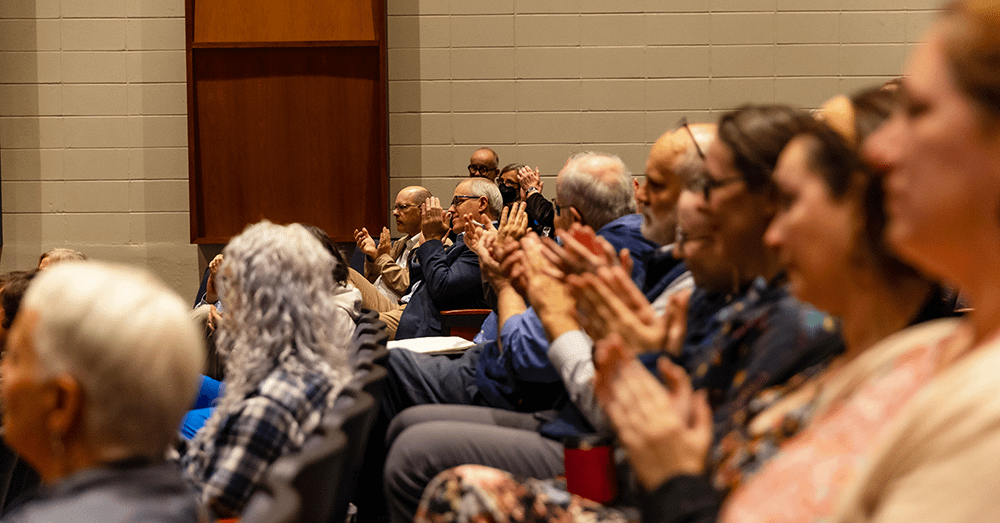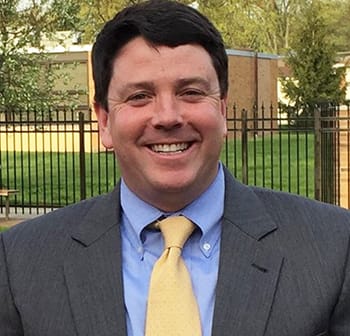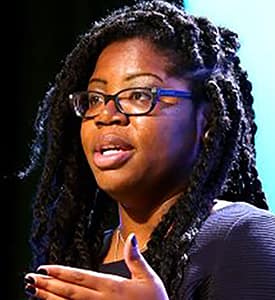NPR war reporter Bowman touts liberal arts during visit
Watch recording of full panel presentation with Bowman and veterans>>
“We need more people with liberal arts education, especially these days,” said Tom Bowman, National Public Radio’s longtime war correspondent and a 1977 Saint Michael’s College history graduate, who made a daylong campus visit Thursday.
“I use my history degree every single day,” Bowman told students in David Mindich’s afternoon Media and American Politics class — one of two classes he joined before an evening public gathering in McCarthy Arts Center. A strong sense of history, he explained, helps him understand and communicate essential context and nuance when filing his reports for NPR from Afghanistan, Iraq, and Washington, D.C., where he regularly roves the Pentagon and drops in on generals.
But good reporting involves a lot more than just hearing the Pentagon’s or White House’s official spin on stories, Bowman stressed at all his appearances. “I walk around and talk to people, find out what’s going on. You can’t just sit at the Pentagon or the White House – they’re always trying to sell you something. Get out and talk to real people,” he advised students or anybody aspiring to effective journalism.
For Bowman, a good example of such “real people” worth hearing were two Saint Michael’s military-veteran students who joined him on the McCarthy stage (at his prior request) for the evening’s question and answer session: Chris Boutin, a Marine veteran majoring in psychology with the hope of helping counsel fellow vets struggling post-service, and Drake Rivas, an Army veteran studying to be a history educator. Both men served multiple tours in Afghanistan and Iraq.
Their stories and opinions alongside Bowman’s about U.S. presence and policies in Afghanistan and Iraq reminded listeners of the vivid and important human and policy stories that still should command more attention around the world, even though cable news and much other media seem now to be all-Trump, all the time.
Bowman, however, is more measured than many in sounding an alarm over a recent perceived “war” on media and other unprecedented initiatives from the new administration that many see as imminently threatening our democracy. “Just do your job and focus on questions and not yourself in press briefings or interviews,” he said would be his advice to journalists in these times. Bowman called coverage of the recent presidential election “awful … disgraceful,” because so few reporters seemed willing to get out talking to real people to “get the pulse.”
Reporters, especially TV personalities, he said, need to realize “they are the least interesting person in the room” at press conferences and news interviews, and so should make stories and coverage less about themselves. In Bowman’s view, the media will survive and be fine, so long as reporters and editors answer the recent wake-up call. “It’s shaken us out of our stupor – we haven’t been good enough in reporting. If we go out and do the work … the standards of journalism will remain where people are still holding the torch.”
Bowman told Mindich’s class that an old-school shoe-leather and have-a-beer reporting style is something he learned to love in his many years as a print reporter right out of Saint Michael’s – first at a smaller paper outside of Boston in his home region and later at the Baltimore Sun, where one of his admired mentors was the respected veteran Jack Germond. “He loved getting out with people, and that’s lost a lot in today’s journalism,” Bowman said.
A few times during his visit, Bowman mentioned Saint Michael’s faculty inspirations and mentors for him, such as Norb Kuntz of history and Bill Wilson of political science, who was a Vietnam veteran.
After a student in Mindich’s class shared that for a project this week she had spoken by Skype with alumni Jonah Kessel and Tim Arango of the New York Times and now was hearing Bowman, Mindich acknowledged how generous Saint Michael’s alumni often seem to be with their time and experience in giving back to students and the College, which is important to the culture. Among topics covered in a free-wheeling class discussion were:
- Bowman’s insights on General H.R. McMaster, newly appointed National Security Adviser, whom Bowman knows and respects; he recommended the “warrior-intellectual” general’s book “Dereliction of Duty,” about failures during the Vietnam war and parallels to today.
- The absolute importance of sources to journalists –“the coin of the realm,” as Bowman said, telling entertaining and insightful stories of how he works Pentagon sources through formal and less formal meetings. “I ask, ‘who can I talk with who really knows what’s going on?” he said. It’s important to “define terms” from the start on such ideas as “off the record” or “background,” so both sides know what’s what, he said. “Stay in your lane,” when deciding what to report, he advised, and always understand a reporter is not there to give policy advice.
- Bowman talked of the care he takes in choosing descriptive words in his reports – for instance, calling Trump “mercurial” recently because it was something “I could back up and believe — it’s not partisan.” He described the effective and essential use of rich sounds in radio reports, and how the medium forces one to write efficiently. “The great thing about radio is you just do it,” rather than belaboring every little thing in rewrites or edits as in print, he said. To master complex subjects like the Mideast and make them understandable, reporters need to “bite off little chunks,” he said. Also, “use pauses” for effect, and speak a little more over-the-top than you might in normal conversation, as if arguing with a family member at dinner, he told a student.
- Students heard of how difficult it was for Bowman last spring when a longtime close photographer colleague was killed during an ambush of their convoy. “I’m still feeling the effects of that – we have it all on tape” and are working on the report about the incident. He told stories of talking with villagers and tribesmen in Afghanistan, or with real soldiers on the ground, to get views that often contradicted what he officially heard from the Pentagon. Leaders end up seeking his insights and respecting him more for doing the work, even so, he said.
- The changing role of social media was a topic – Bowman said “it’s really good for tips … but it’s important to always consider the source; check it out and be careful.” Referencing Marshall McLuhan’s classic notion of our shrinking world in a technological age and the narrow bias-affirming news sources consumers seem to limit themselves to, he said, “We’re clearly in the Global Village. But everyone’s in their own little cottage.”
- During the evening program with the veterans, Bowman touched on some of the same points again; but the panelists covered other vast territory, too:
- To start the discussion, the emcee Angie Armour of the Alumni Office, Bowman’s official host for the day, played a clip via the computer of a long 2011 report filed from Afghanistan by Bowman, filled with rich and dramatic sounds and interviews out among the troops and the locals, emblematic of his preferred style.
- Bowman mentioned how he has heard that Pentagon officials are thinking of sending 1,000 more troops over into such a difficult situation again. Panelists spoke of their views on “staying or going,” both in Afghanistan and Iraq. Boutin said of Afghanistan, “I think we did the job we set out to do and now it’s up to them to do it themselves … They’re honorable people who have their own code of ethics, willing to work with Americans, but I don’t’ think going back is in the best interest of the country anymore.” Rivas had another view: “I don’t know if leaving at the earliest opportunity is the best choice because of what happened in Iraq,” he said. Bowman said he felt “there will be some kind of presence for a long time” in either of those war zones that he covers, unfortunately; Dysfunctions in the governments and other complexities create parallels to Vietnam for the U.S., he said.
- Bowman shared that now, from his observation, “the great concern of the Pentagon is China. They think Russia may be a problem for a few years, but long-term, it’s China, more as a rival than as a bitter enemy. But anything can happen.”
- Boutin and Rivas both stressed that Americans don’t hear enough about all the good humanitarian work U.S. troops do on a sustained basis overseas. “We provided school supplies, hospitals, built greenhouses to get economies going,” Rivas said in explaining to one questioner that he did not feel either campaign he joined was a “vengeance mission.” Boutin agreed – and both men seemed to harbor few if any hard feelings toward Afghanis or Iraqis, even those they fought, articulating an almost Zen-like peace and humanity about the whole matter. Boutin, though, said he was sorry to see that between an early and later tour to Afghanistan, the independent pride of tribesmen seemed to diminish as they became more reliant on aid; but Iraqis enthusiastically sought any aid offered, right from the start, all three men agreed – so the cultures were different in that way. Bowman spoke of “mission creep” that seemed to expand a limited initial-focus mission to a sort of cumbersome latter-day “Marshall Plan.”
- Both veterans said their main “coping method” after experiencing the traumas of war was re-enlisting for more tours, since in a strange way, soldiers come to like many aspects of life on a deployment. Bowman stressed that what the veterans did was “light years” from his relatively limited time and duties as a reporter, and he spoke of the great respect he has for the soldiers he meets in his reporting.
- Asked what they thought about reinstituting a draft, neither of the veteran-panelists thought it was a good idea; to them, it’s important that “everybody wants to be there” who is serving, and a draft would degrade the quality they experienced. But, all three men liked the idea of some kind of mandatory service to the nation for all over 18, perhaps two years, even if it was domestically in the service of others in some way and not military. Bowman said World War II’s draft brought “elites” together with regular folks in a way that never would have happened otherwise — and would be useful in today’s national climate in that mandatory service might offer some of that much-needed geographic and cultural mixing across the U.S. again.
Bowman said he remembered hearing critics of liberal arts education 20 years ago when he would tell folks back home he was studying history at Saint Michael’s — but he’s still convinced from his life experience that “it teaches people to think and write well – skills everyone needs — so to me, it’s mind-boggling that people still argue against it.”





